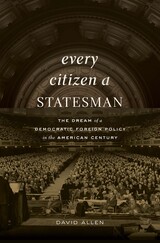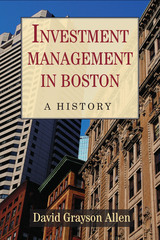
Allen utilizes historical, philosophical, sociological, and legal sources to trace America's gradual embrace of corporate values. He argues that such values, including winning, efficiency, and profitability actually limit democratic involvement by devaluing discursive principles, creating an informed yet inactive public. Through an examination of professionalization in both the press and the law, corporate free speech rights, and free speech as property, Democracy, Inc. demonstrates that today's democracy is more about trying to control and manage citizens than giving them the freedom to participate. Allen not only calls on institutions to reform the way they understand and promote citizenship but also asks citizens to adopt a new ethic of public discourse that values understanding rather than winning.

These volumes begin the publication of the greatest diary, both in mass and substance, in American History. Recording a span of sixty-eight years, it has been known heretofore only in partial form. When, over a hundred years ago, Charles Francis Adams edited his grandfather’s diary, he chose to omit “the details of common life,” reduce “the moral and religious speculations,” and retain criticisms of others only if they applied to public figures “acting in the same sphere with the writer.”
Now the diary is being published complete for the first time. Starting with the entries of a twelve-year-old, the present volumes cover John Quincy Adams’ formative year—his schooling and travel broad, study at Harvard, and the first months of training for the law. Adams’ six years overseas with his father took him to a half dozen countries, with lengthy stays in Paris, the Netherlands, and St. Petersburg. On his return he stayed for a time in New York, making the acquaintance of influential congressmen. To finish preparing for college, he lived with an aunt and uncle in Haverhill, caught up in a round of social activities. Entering Harvard with junior standing in the spring of 1786, he graduated in fifteen months.
As Adams matured, diary entries became less a dutiful response to a father’s request and more a record of the young man’s perceptive observations and reflections—and thus a rich source for social history. There are accounts of play-going in Paris, evenings with Lafayette and Jefferson, the diversions of rural New England, apprenticeship in a Newburyport law office. And through the eyes of a serious but not unbending student we are given a picture of Harvard in the 1780s.
Candid opinions of preachers, writers, men of affairs, and family members accompany the closest self-scrutiny. Here is a remarkable record of the passage from adolescence to manhood of a precocious and sensitive boy torn by self-doubt and driving himself to fulfill his promise and his parents’ expectations.

Volumes 1 and 2 of the Diary of John Quincy Adams begin the publication of the greatest diary, both in mass and substance, in American History. Recording a span of sixty-eight years, it has been known heretofore only in partial form. When, over a hundred years ago, Charles Francis Adams edited his grandfather’s diary, he chose to omit “the details of common life,” reduce “the moral and religious speculations,” and retain criticisms of others only if they applied to public figures “acting in the same sphere with the writer.”
Now the diary is being published complete for the first time. Starting with the entries of a twelve-year-old, the present volumes cover John Quincy Adams’s formative year—his schooling and travel abroad, study at Harvard, and the first months of training for the law. Adams’s six years overseas with his father took him to a half dozen countries, with lengthy stays in Paris, the Netherlands, and St. Petersburg. On his return he stayed for a time in New York, making the acquaintance of influential congressmen. To finish preparing for college, he lived with an aunt and uncle in Haverhill, caught up in a round of social activities. Entering Harvard with junior standing in the spring of 1786, he graduated in fifteen months.
As Adams matured, diary entries became less a dutiful response to a father’s request and more a record of the young man’s perceptive observations and reflections—and thus a rich source for social history. There are accounts of play-going in Paris, evenings with Lafayette and Jefferson, the diversions of rural New England, apprenticeship in a Newburyport law office. And through the eyes of a serious but not unbending student we are given a picture of Harvard in the 1780s.
Candid opinions of preachers, writers, men of affairs, and family members accompany the closest self-scrutiny. Here is a remarkable record of the passage from adolescence to manhood of a precocious and sensitive boy torn by self-doubt and driving himself to fulfill his promise and his parents’ expectations.

Volumes 1 and 2 of the Diary of John Quincy Adams begin the publication of the greatest diary, both in mass and substance, in American History. Recording a span of sixty-eight years, it has been known heretofore only in partial form. When, over a hundred years ago, Charles Francis Adams edited his grandfather’s diary, he chose to omit “the details of common life,” reduce “the moral and religious speculations,” and retain criticisms of others only if they applied to public figures “acting in the same sphere with the writer.”
Now the diary is being published complete for the first time. Starting with the entries of a twelve-year-old, the present volumes cover John Quincy Adams’s formative year—his schooling and travel abroad, study at Harvard, and the first months of training for the law. Adams’s six years overseas with his father took him to a half dozen countries, with lengthy stays in Paris, the Netherlands, and St. Petersburg. On his return he stayed for a time in New York, making the acquaintance of influential congressmen. To finish preparing for college, he lived with an aunt and uncle in Haverhill, caught up in a round of social activities. Entering Harvard with junior standing in the spring of 1786, he graduated in fifteen months.
As Adams matured, diary entries became less a dutiful response to a father’s request and more a record of the young man’s perceptive observations and reflections—and thus a rich source for social history. There are accounts of play-going in Paris, evenings with Lafayette and Jefferson, the diversions of rural New England, apprenticeship in a Newburyport law office. And through the eyes of a serious but not unbending student we are given a picture of Harvard in the 1780s.
Candid opinions of preachers, writers, men of affairs, and family members accompany the closest self-scrutiny. Here is a remarkable record of the passage from adolescence to manhood of a precocious and sensitive boy torn by self-doubt and driving himself to fulfill his promise and his parents’ expectations.

The surprising story of the movement to create a truly democratic foreign policy by engaging ordinary Americans in world affairs.
No major arena of US governance is more elitist than foreign policy. International relations barely surface in election campaigns, and policymakers take little input from Congress. But not all Americans set out to build a cloistered foreign policy “establishment.” For much of the twentieth century, officials, activists, and academics worked to foster an informed public that would embrace participation in foreign policy as a civic duty.
The first comprehensive history of the movement for “citizen education in world affairs,” Every Citizen a Statesman recounts an abandoned effort to create a democratic foreign policy. Taking the lead alongside the State Department were philanthropic institutions like the Ford and Rockefeller foundations and the Foreign Policy Association, a nonprofit founded in 1918. One of the first international relations think tanks, the association backed local World Affairs Councils, which organized popular discussion groups under the slogan “World Affairs Are Your Affairs.” In cities across the country, hundreds of thousands of Americans gathered in homes and libraries to learn and talk about pressing global issues.
But by the 1960s, officials were convinced that strategy in a nuclear world was beyond ordinary people, and foundation support for outreach withered. The local councils increasingly focused on those who were already engaged in political debate and otherwise decried supposed public apathy, becoming a force for the very elitism they set out to combat. The result, David Allen argues, was a chasm between policymakers and the public that has persisted since the Vietnam War, insulating a critical area of decisionmaking from the will of the people.

It was not until the twentieth century that Boston became better known for its role in investment management. In 1924, local financiers created the first mutual fund, an innovation almost a century in the making. After World War II, Boston originated venture capital with the founding of American Research & Development. This was soon followed by the development of private equity, the growth of the mutual fund industry, the pension "revolution" that changed and strengthened money management, the evolution in management of institutional endowments, and the rise of new family offices and hedge funds. The contributions of fiduciaries and investment managers have played an important part in the rise of the "New Boston" and made the city one of the most vibrant financial capitals in the world.
Investment Management in Boston is published in association with Massachusetts Historical Society.
READERS
Browse our collection.
PUBLISHERS
See BiblioVault's publisher services.
STUDENT SERVICES
Files for college accessibility offices.
UChicago Accessibility Resources
home | accessibility | search | about | contact us
BiblioVault ® 2001 - 2024
The University of Chicago Press









